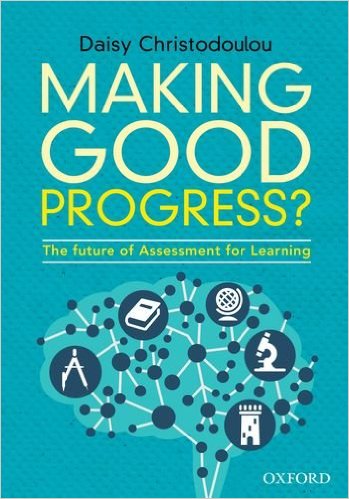
You can find the chapter analyses below, however I want to offer something by way of an overall summary of the book.
CHAPTER 1 - Why didn't AfL Transform Schools?
CHAPTER 2 - Curriculum Aims and Teaching Methods
CHAPTER 3 - Making Valid Inferences
CHAPTER 4 - Descriptor Based Assessment
CHAPTER 5 - Exam Based Assessment
CHAPTER 6 - Life After Levels
CHAPTER 7 - Improving Formative Assessment
CHAPTER 8 - Improving Summative Assessment
CHAPTER 9 - An Integrated Assesment System
I generally enjoyed reading “Making good progress?” and found the argument cogent and, on the surface, persuasive. I do however have some reservations about Christodoulou’s complete rejection of carefully considered constructivism, as I detail in the chapter reviews. If nothing else, Christodoulou has provided a useful synthesis of many decades of thought on assessment, across many disciplines.
Yet I also feel like the book was something of a missed opportunity. If it is read widely, then this book may have a big impact (though I imagine it will circulate
Limited progress in understanding the classroom view of progress
There is certainly a place for analyses of the state of play like this, but even then I am not sure it adds much to the overall picture. Where Christodoulou might have productively added to the debate might have been in a contribution to the empirical work on understanding schools' interpretations of assessment. There is huge scope for a proper investigation into teachers’ understanding of progression, something which might have been done via her connections with the Ark chain. Certainly, such a study might have illuminated more about why so many teachers have struggled to make progress in their understanding of progress.
On this theme, and with scant supporting evidence, I remain less than convinced by Christodoulou’s underlying suggestion that philosophical divisions explain the lack of effective assessment in schools, and the dominance of the “generic skills”. Christodoulou sees education as being driven by great, clashing ideologies: her science of cognition versus the religion of “generic skills”. Looking primarily at those in educational leadership (promoted via various government schemes), and the inevitable backlash against such leaders; the directions promoted by the inspection regime (historically); and the scrawlings of high profile agitators; certainly suggested an enormous ideological gulf. Yet I would argue that what we are seeing is nothing more than a coup at the very top level of education - one educational philosophy battling for supremacy with another.
To give an analogy, viewed from above, the English Reformation appears to be a seismic shift in people’s attitudes and beliefs brought about through a great battle of ideas. Yet, viewed from below, the Reformation can be seen as a much longer process of everyday conservatism and resistance, accompanied by more gradual acceptance and compromise.
Observed from the perspective of the classroom teacher, I suspect the picture is quite a different one to that painted by Christodoulou. Experience suggests that the majority of teachers already practice many of the approaches that Christodoulou is keen to promote, but probably use these alongside generic approaches as well. Most are governed by a general pragmatism: responding to pressure from senior leaders, but also having an awareness of what works in the privacy of their classroom. Some more detailed research into attitudes of classroom teachers would have allowed us to gain a greater insight into this crucial area. Unless we understand the processes by which teachers understand assessment, we will never really be able to grasp how meaningful change can be brought about. As I have suggested before, shouting at people until they comply is not the same as shifting mindsets.
Final Thoughts
Despite the reservations I have just outlined, the book (with notable oversights in terms of reliability and validity) is a useful introduction to the principles of assessment if read in context. It is certainly a good way to understand the politics of the current educational landscape and I will be recommending chapters 3, 6, 7 and 8 to my trainees.
My sincere hope however, is that we now see some meaningful research done on how classroom teachers have navigated this world of political interference in their classrooms and to gauge the needs we need to meet in the average classroom.

 RSS Feed
RSS Feed
